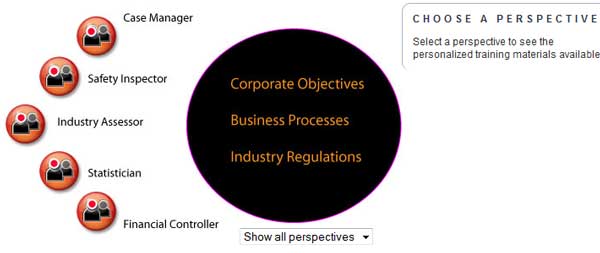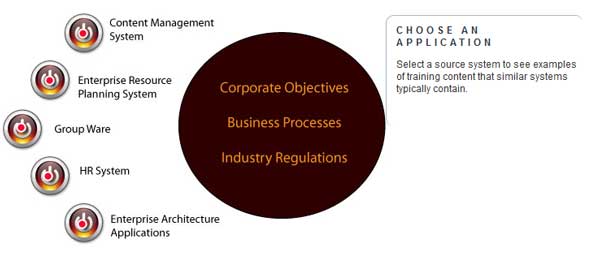Venture Pitch
Businesses have made significant investments in digital knowledge assets and learning management systems but where is the evidence of their Return on Investment? Corporate strategies continue to change, new industry and political regulations continue to be introduced, business processes evolve while related information embedded in training products quickly becomes out of synch resulting in conflicting and inaccurate training material.
Corporations who invested heavily in e-learning and were disillusioned by the results have realized the need for more a personalized approach to training. However, the business drivers that were the impetus to e-learning have only gotten more pronounced. The Corporate Personal Learning Platform offers a solution.
Corporate eLearning ~ $7 Billion Industry
Bersin & Associates (2008) estimated the Corporate eLearning market to be $7 billion dollars. Margolis (2010) have identified that Corporate colleges are the fastest growing sector in education where in some cases enrollment outnumber traditional universities. Margolis cites Renaud-Coulon in describing the importance of these colleges as “spaces of applied education to put business strategies into motion”. According to Infosys CEO Kris Gopalakrishan “what we do is bridge the gap between what the academic institutions do and what industry requires” (Margolis, 2010). What this new venture is proposing is to provide a framework and software that would assist filling the gap by providing scalability for the implementation and maintenance of personalized learning modules.
Targeting large organizations alone at an estimated $50,000 per package would result in $2.5 million in revenue for the initial implementations alone. Additional customizations and annual software maintenance fees would yield additional revenues. While the primary target market for this venture is large to medium sized corporations it would also be useful across industry associations and government agencies.
| # of Companies |
# locations |
# employees | |
| Enterprise | 930 | 558,000 | 31.5 million |
| Large Organizations | 5,000 | 296,000 | 16.8 million |
| Medium Organizations | 97,000 | 477,000 | 25.7 million |
| Small Organizations | 4.8 million | 5 million | 40.7 million |
Market Differentiator
Because personalized learning is an emerging market new ventures have been focused on foundational aspects of instructional design, business e-learning strategy, and software to create personalized training modules.
The reason this venture is different is that it addresses the underlying scalability challenges that undermines widespread corporate adoption of the personalized e-learning approach.
Without an automated way to access knowledge assets, creating and maintaining personalized learning modules will be labour intensive. Without a strategy to address the underlying metadata management problem, the corporation risks high labour costs for development and low quality content which results from poor quality digital asset sources.
The problem with the current approach to personalized training is that it is costly and time consuming to develop, and would require significant on-going maintenance if it is to evolve with business changes. This translates into significant effort on the part of instructional designers who need to search across enterprise systems for the required content and attempt to determine the quality and accuracy of the business metadata.
The original appeal of e-learning platforms (low cost due to automation) is contradicted by personalized learning approach unless there is a way to introduce a level of automation and scalability.
In addition to the role of business metadata in making content management more efficient, according to Baston (2011) it is also a key requirement that is lacking to support individual management over a learner’s artifacts for product based assessments. Boston (2011) identifies the missing technical functionality as a key area needing more attention in the market place because “…learners need an easy way to find, organize, and cull their artifacts/evidence continually.”
The Scalability Problem – Illustrated
Multiple Perspectives
Click the following image to see examples of how content is specific to an employees role in the organization.
Multiple Source Systems
Click the following image to for more information about potential sources of digital knowledge assets.
Corporations have long been challenged by a related underlying business metadata problem while advances in the public sphere have quickly taken off. Folksonomy has created an accessible, searchable Internet that rivals that of any Corporate Intranet. This has resulted in a state where, in some cases, the employee can find more information about their business, role, and current activities on the Internet than they can in their own Corporate Intranet.
To address these challenges, an effective corporate personalized learning platform requires
- integration of digital knowledge assets from across multiple sources
- relating digital knowledge assets to employee roles
- supporting easy accessibility and maintenance of underlying business metadata
- automatically connecting and updating content to corprate objectives as they evolve

